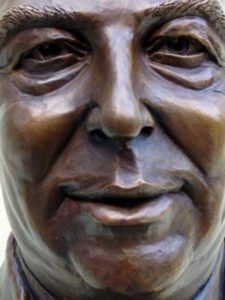Wednesday

Lewis the Libertarian
Every so often, you see an article that makes you drool. That happened to me last weekend with an article that I found at Lew Rockwell: C.S. Lewis the Libertarian. As a younger man, I read a ton of Lewis: The Great Divorce, Mere Christianity, God in the Dock, Screwtape, etc. I even grappled a while with Studies in Words and The Allegory of Love (didn't finish 'em, but tried to). My son, Jack, is named after C.S. Lewis. And now, as a middle-aged man, I've been reading everything libertarian: von Mises, Rothbard, Hayek. Imagine my excitement when I saw these two disciplines melded into one long essay. I read it in shifts . . . and enjoyed every minute. Excerpts:
Lewis's aversion to government was clearly revealed in 1951 when Winston Churchill, within weeks after he regained office as prime minister of Great Britain, wrote to Lewis offering to have him knighted as “Commander of the Order of the British Empire.” Lewis flatly declined the honor because he, unlike the “progressives,” was never interested in politics and was deeply skeptical of government power and politicians, as expressed in the first two lines of his poem “Lines during a General Election”: “Their threats are terrible enough, but we could bear / All that; it is their promises that bring despair.” . . .
* * *
Lewis noted that “I do not like the pretensions of Government–the grounds on which it demands my obedience–to be pitched too high. I don't like the medicine-man's magical pretensions nor the Bourbon's Divine Right. This is not solely because I disbelieve in magic and in Bossuet's Politique. I believe in God, but I detest theocracy. For every Government consists of mere men and is, strictly viewed, a makeshift; if it adds to its commands 'Thus saith the Lord,' it lies, and lies dangerously.” . . .
* * *
As a proponent of natural law, Lewis was a supporter of the “law of equal liberty” but a firm critic of imposed egalitarianism for any reason. He further understood that egalitarianism is too often a cloak for envy (the sin of coveting) and that such appeals for regimentation are tyrannical . . .
* * *
[I]n Lewis's novel The Screwtape Letters, the demonic Screwtape instructs his pupil Wormwood to mislead his human “patient” by using the convoluted “progressive” concept of “social justice” in order to twist what appears to be Good into Evil and seduce the person into sin: “On the other hand we do want, and want very much, to make men treat Christianity as a means; preferably, of course, as a means to their own advancement, but, failing that, as a means to anything–even to social justice. The thing to do is to get a man at first to value social justice as a thing which the Enemy [God] demands, and then work him on to the stage at which he values Christianity because it may produce social justice. For the Enemy will not be used as a convenience.”
* * *
Above all, Lewis was a keen observer of the world he lived in, consistently recognizing the implications of every development in the galloping socialism of post”“World War II England:
[T]he political philosophy implicit in most modern communities . . . has stolen on us unawares. Two wars necessitated vast curtailments of liberty, and we have grown, though grumblingly, accustomed to our chains. The increasing complexity and precariousness of our economic life have forced Government to take over many spheres of activity once left to choice or chance. Our intellectuals have surrendered first to the slave-philosophy of Hegel, then to Marx, finally to the linguistic analysts. As a result, classical political theory, with its Stoic, Christian, and juristic key-conceptions (natural law, the value of the individual, the rights of man), has died. The modern State exists not to protect our rights but to do us good or make us good–anyway, to do something to us or to make us something. Hence the new name “leaders” for those who were once “rulers.” . . . We are less their subjects than their wards, pupils, or domestic animals. There is nothing left of which we can say to them, “Mind your own business.” Our whole lives are their business.
